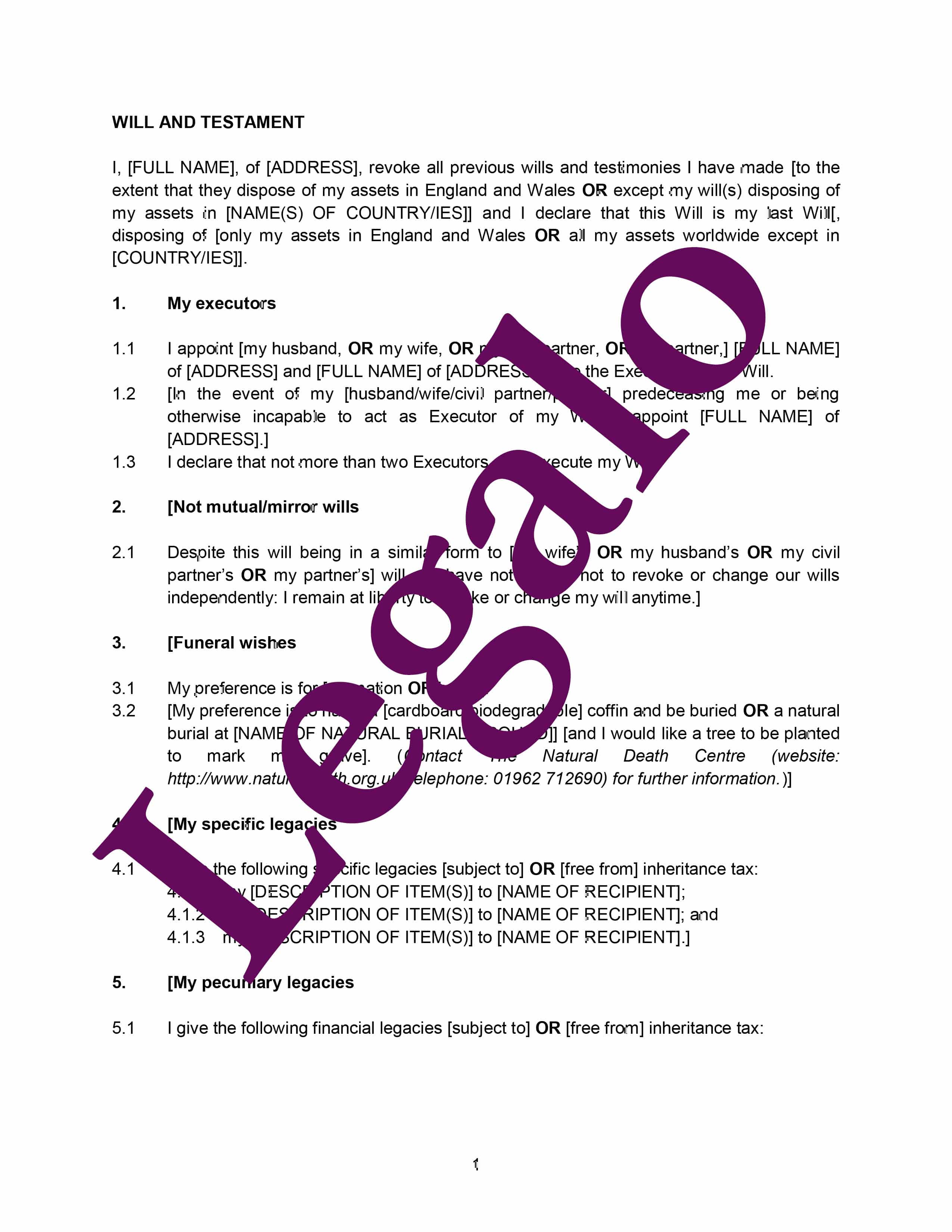Will For Couple Without Children
Our Will For Couple Without Children template:
- Ideal for couples without children
- Template drafted by a UK legal expert
- Full money-back guarantee
- Create your legally binding will in minutes

How Does It Work?
-
1. Download
-
2. Edit
-
3. Print
-
4. Sign
This Will For Couple Without Children template is a version of our standard will template, which has been adapted specifically for use by a couple that does not have children. Both married and unmarried couples can use this will template, so long as you live in the UK. That includes England, Wales, Scotland and Northern Ireland.
You can buy it once, and use it for both of you, so it really is good value. If you ever need to update or amend your will, you can download the latest version free of charge. So with Legalo you only pay for your will once. You can reuse it yourselves as many times as you want and never pay again.
It is easy to make your Will with Legalo’s template
Detailed guidance notes come with our template, which walk you through each clause in the will for couple without children template. The guide makes it so easy for you to produce your will from the template. Please note that our will templates do not include setting up a trust by your will. That is because (a) trusts are complex and (b) most people do not need them.
When you create a will when you have no children, it ensures that your executors will implement your wishes as to whom you want to leave your estate. This is particularly important for unmarried couples. Unmarried partners do not automatically pass any of their estate to their partner. Don’t forget that there is no such thing as a “common law” wife or husband in English law.
You would not want to have no will and end up with the intestacy rules applying, which might leave nothing to your unmarried partner.
Using this Will For Couple Without Children template
David, our co-founder and solicitor of over 20 years, has created this will template. By taking 15 minutes each to complete your will template, your partner and yourself can have peace of mind.
You can download the will for couple without children template and the helpful guidance notes, which come with the template. Then you can start writing your will at your computer. It really will only take you a few minutes to sort it out and gain the peace of mind that you now have a valid will in place that reflects your wishes. We offer a full money-back guarantee – we are that confident in our template. So you can request a full refund, if you are unsatisfied.
Once you have properly signed and dated your will, you need to think about where to store it safely. We recommend the government’s will storage service, which only costs a one-off fee of £20 per will: click here for more details.
What if I don’t make a will?
If you fail to make a will and die “intestate”, then there are rules which say who inherits your estate. There are not always fair to your close relatives and you may well not want them to apply. You can find the details of the intestacy rules here: https://www.gov.uk/inherits-someone-dies-without-will. For more information on some specific situations in which you would definitely not want the intestacy rules to apply, have a look at our blog article on this.
FAQs on wills for couples without children
Below, we have addressed the top questions from the Internet on this topic. Please note that the answers below do not rule out someone disputing the will or lack of provision for them if they are a dependent.
Does a childless couple need a will?
A married childless couple in the UK can benefit from their each having a will, the same as anyone else. There is no legal requirement to make a will, but a will ensures that the executors will distribute the assets in accordance with the couple’s wishes. It also provides peace of mind and can prevent disputes down the line. Creating a clear will is necessary if one or both spouses have specific wishes about asset distribution or want to leave their estate to particular individuals or charities.
For an unmarried childless couple, it is essential to make wills. This is because, as they are unmarried, the rules that apply if you have not made a will (the Intestacy Rules) do not pass anything over to your unmarried partner. So it is crucial that you each make a will, in order to make proper provision for your partner.
Who to leave money to in a will if no children.
In the absence of children, a childless couple may leave assets to each other, in which case the surviving spouse or partner becomes the primary beneficiary. If both spouses / partners pass away simultaneously, they can leave their estate to friends, the wider family, or charity. You should set out the specifics of this distribution in the will, to make it clear to the executors how they should share out the assets.
What is the best type of will for a married couple?
The best type of will for a married couple in the UK is typically a “Mirror Will“. (The same applies to an unmarried couple.) This type of will is essentially two individual wills, one for each spouse, that mirror each other’s provisions. They often name each other as the primary beneficiary, ensuring assets pass to the surviving spouse. Then they write a secondary provision in, specifying where the assets go once the second spouse dies, such as to close friends, relatives or charities.
Who is next of kin if not married and with no children?
If an individual is not married and has no children, their next of kin is typically their closest blood relative. The unmarried partner is not your next of kin at all in legal terms. Your blood relatives can include parents, siblings, or other immediate family members. In situations where there are no close blood relatives, the designation of next of kin can become more complex and may involve more distant relatives. Where you have made no will, the Intestacy Rules apply, to determine which relatives receive your assets in which order of priority.
As you can see, in order to make proper provision for your unmarried partner, it is crucial to make a will, otherwise they will receive nothing.
Can stepchildren inherit if there is no will?
In the UK, stepchildren do not have an automatic right to inherit anything if there is no will. This is because the Intestacy Rules prioritise your biological and legally-adopted children. Stepchildren can inherit only if:
- they are legally adopted by the deceased (in which case they are treated as your children for the purposes of the Intestacy Rules if you have no will); or
- if you have a will and explicitly leave them something in your will.
Without this, their inheritance rights are nothing. This is why it is so important to create a will if you want some of your assets to go to your stepchildren.
Can I make a will excluding my wife?
In the UK, it is possible to create a will that excludes your wife. However, it is crucial to fulfil the legal requirements by making proper financial provision for her in some manner, as she is very likely to be your dependent. Failure to do so may result in a potential legal claim by her against your estate.
What happens if the husband dies and the house is only in his name?
When a husband passes away and he had held the house in his sole name, you normally obtain probate. This process involves evaluating the deceased’s assets, including the house, and distributing them in accordance with his will, or the Intestacy Rules if there is no will in place. Several factors can influence the rights of the surviving spouse to the property, such as:
- the specific provisions in the will; and
- whether the husband held the house in trust for his wife.
If the will has not made adequate provision for the wife, then she may take the estate to court to apply for proper financial provision as a dependent.
What should you not write in a will?
In a will, you should avoid including gifts of assets not owned by you, unlawful requests, conditional gifts, information on personal matters, ambiguous language, revocation language, discrimination or attempts to disinherit a spouse (or other dependent) without proper legal consideration. It is also vital to make sure that you signed your will and had it witnessed in the correct manner.
Does a spouse automatically inherit everything with a will?
In the UK, it’s important to note that a spouse does not automatically inherit the entire estate based solely on the existence of a will. It depends mainly on what the terms of the will state. While there are legal provisions in place to protect the rights of a surviving spouse, a will can specify different beneficiaries to inherit some of the assets.
However, UK law does provide a legal right for the surviving spouse who is a dependent to claim a portion of the deceased’s estate, even if the will has excluded them. The specific portion that the surviving spouse is due is determined by several factors. These include whether the couple has children.
Is a common law wife entitled to anything?
In the UK, it’s important to understand that the law does not recognise a “common-law marriage”. As a result, common-law partners do not possess any automatic inheritance rights. Unmarried partners, often referred to as “common-law spouses”, do not enjoy the same legal entitlements as married couples. To ensure inheritance rights and financial protection, it is crucial for unmarried couples to establish wills ( … or marry). Without these provisions in place, the surviving partner may have limited rights to inherit from the deceased partner. The survivor would need to take the estate to court to apply for a legacy on the basis of their being a dependent of the deceased. This is costly and stressful. It is far better to make a will when you are an unmarried couple, making proper provision for your partner. (Or you could get married of course.)
What is a wife entitled to when her husband dies?
In the UK, when a husband passes away, his wife is entitled to provision that depends on the specific circumstances. If there is a valid will, the instructions in the will will set out what the wife is due to inherit. If there is no will, the wife still has legal entitlements under intestacy laws. These laws typically grant the wife a portion of the deceased husband’s estate. The precise amount depends on whether the couple have children.
Can I leave my house to a friend in my will?
In the UK, it is indeed possible to leave your house to a friend in your will. A will grants you the ability to designate beneficiaries, and this can include close friends. However, it is crucial to ensure that:
- your will is legally valid; and
- all potential inheritance tax consequences have been considered.
Additionally, take into account any outstanding mortgage or financial obligations associated with the house when making these specific provisions. By addressing these factors, you can ensure that your wishes are properly documented and executed.





